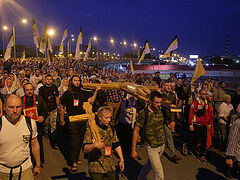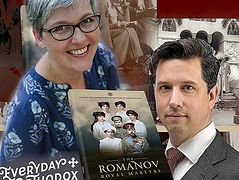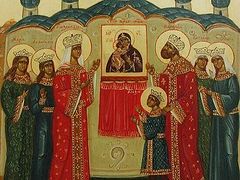Moscow, July 20, 2020
 Photo: tsarnicholas2.files.wordpress.com
Photo: tsarnicholas2.files.wordpress.com
In the course of its work and its battery of genetic examinations initiated by the Russian Orthodox Church in 2015, the Investigative Committee of the Russian Federation has confirmed the veracity of the remains said to belong to Royal Martyr Nicholas II and his martyred family, though research and examinations continue in order to remove even the slightest doubt, senior investigator Marina Molodtsova said in an interview with Izvestia published on Thursday, the feast of the Royal Martyrs.
“Since case was resumed in 2015, 37 new forensic examinations have been carried out, including forensic (anthropological), molecular genetic, trace evidence, and handwriting analysis among others,” she stated. “In addition, various kinds of investigative experiments were conducted as part of the investigation. In some cases, their results allowed us to reconstruct a more complete picture of events.”
“Based on numerous examinations, the investigation has concluded that the remains belong to Nicholas II, his family, and their entourage,” the senior investigator said. “Nevertheless, we continue to collect materials and conduct further forensic examinations which we deem necessary in order to eliminate the slightest doubt. At the end of all examinations, their results will be evaluated in aggregate,” Molodtsova added.
For example, experts are now talking about making a 3-D model of the hat Tsar Nicholas was wearing when he was injured in the head in Japan, which is kept in the Hermitage Museum in St. Petersburg, in order to compare the damage to the hat with the injuries on the skull believed to belong to Tsar Nicholas.
“According to the conclusion of molecular genetic examinations, the remains of two persons found in the summer of 2007 near the burial site of nine other victims belong to the daughter and son of Nikolai and Alexandra Romanov,” Molodtsova also noted. “The biological relationship of both parents is established with the maximum probability for both Alexei and Maria.”
Several theories have also been disproven through the Committee’s work, she said, including that the Ipatiev House basement room was too small to hold so many people, and that the bodies of the Royal Martyrs were destroyed by sulfuric acid and fire.
The Committee has also pored over 2,000 historical sources related to the murder of the Royal Family.
The Association of Members of the Romanov Family hopes for a speedy resolution to the situation that could allow the remains of Sts. Alexei and Maria to be buried by the 103rd anniversary of their martyrdoms next year.
The Investigative Committee earlier stated in July 2018 that it had confirmed the veracity of the remains.
***
A grave with nine bodies was found on Staraya Koptyakovskaya Road near Ekaterinburg in July 1991. The remains were identified as those of Emperor Nicholas II, his 46-year-old wife Alexandra Fyodorovna, their daughters Olga, 22, Tatiana, 21, and Anastasia, 17, and their servants Eugene Botkin, 53, Anna Demidova, 40, Alexei Trupp, 62, and Ivan Kharitonov, 48.
Members of the imperial family were buried at a sepulcher of the Peter and Paul Cathedral in St. Petersburg.
The remains of two more people were discovered during archaeological excavation works 70 meters south of the first grave on July 26, 2007. The remains have still not been buried, but numerous expert analyses indicate that the remains were most likely those of Tsarevich Alexei and his sister Maria.




